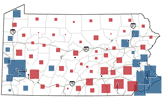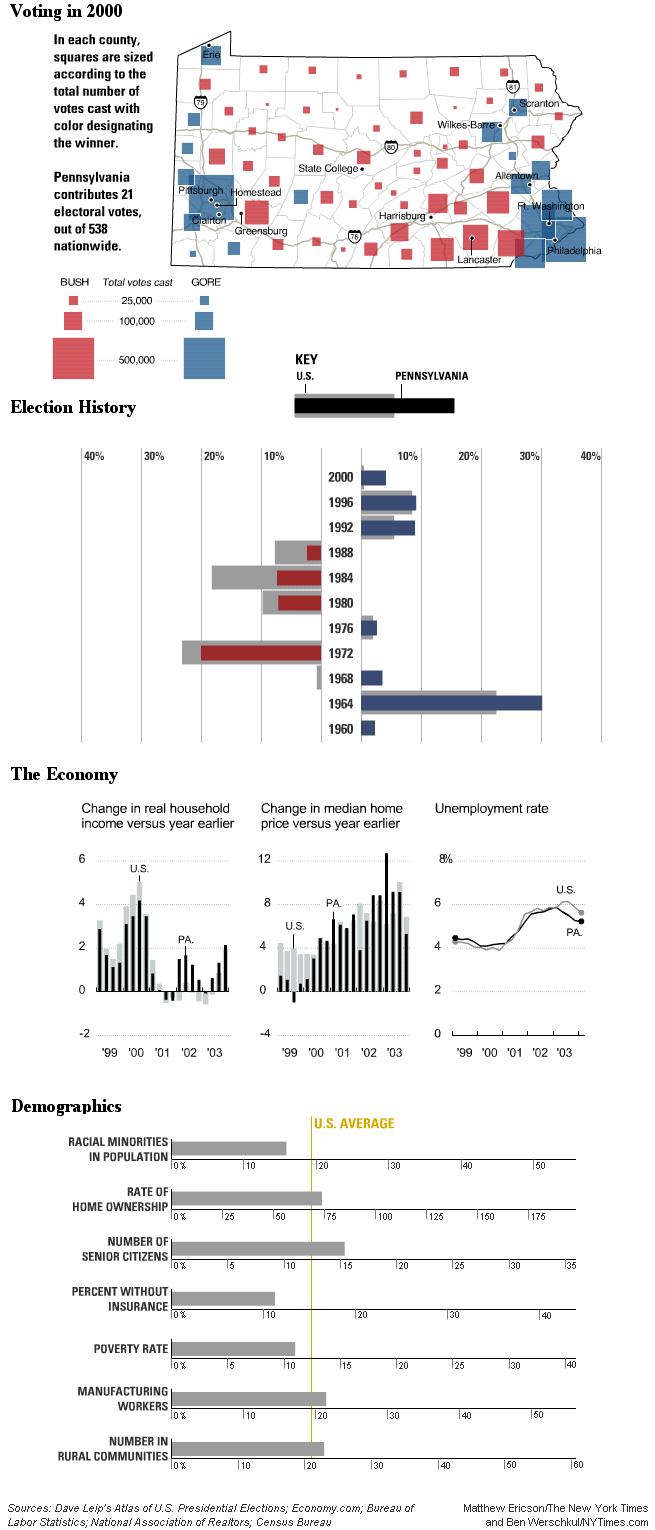
Published: August 24, 2004
Article originally published at http://www.nytimes.com/2004/08/24/politics/campaign/24states.html

 AYNE, Pa. - The ladies lunching on the veranda of the venerable Wayne Hotel here had nothing nice to say about Senator John Kerry, but that did not prevent them from saying it.
AYNE, Pa. - The ladies lunching on the veranda of the venerable Wayne Hotel here had nothing nice to say about Senator John Kerry, but that did not prevent them from saying it.
"He's a fraud," said Alida Haslett, 53, who works in a framing shop and lives in nearby Bryn Mawr. "I don't believe he's a war hero."
Her companions were equally sour on Mr. Kerry, the Democratic presidential nominee.
"He's a Kennedy wannabe," said Carol Ogelsby, 50, who sells real estate.
"There's nothing like a wannabe," put in Betsy Grace, also 50, who works in architectural restoration.
Those women are crucial to President Bush's hopes for winning Pennsylvania. They voice no complaints about the economy, see the American presence in Iraq as positive and support the president's opposition to same-sex marriage, although they are mixed on his opposition to abortion rights.
In short, the women reflect the Republican values that have prevailed for generations along this stretch of long-settled affluent suburbs named for the Main Line of the Pennsylvania Railroad, which began ferrying commuters westward from Philadelphia in the 1880's and where, Ms. Ogelsby said, the median price of a home runs $700,000 to $800,000.
But Mr. Bush cannot take too much comfort from the women. Even they expressed a sense of foreboding about his chances here in November. Ms. Grace conceded that she was at odds with her own family.
"They're not all Republicans," she said. "In fact, I'm probably one of the few. It's a little scary."
Ms. Ogelsby said that she had Republican friends "who are angry at Bush and went to see 'Fahrenheit 9/11,' and they all stood up and clapped at the end."
Voters here in Delaware County and in three other suburban counties are overwhelmingly registered Republicans. But three of the counties, Bucks, Delaware and Montgomery, tipped the state for Bill Clinton in 1992 and 1996 and for Al Gore in 2000.
This trend in the state's affluent southeastern suburbs is reflected in the state's grittier southwestern counties, where the economy has long been tied to big steel. Since the New Deal and the rise of unions, those counties have been staunchly Democratic. But for nearly two decades, the culturally conservative blue-collar workers in the southwest, where hunting is practically a religion, have been leaning Republican.
Because the suburban southeast and Philadelphia are bigger than the old mill towns of the southwest and Pittsburgh, the southeast tends to control statewide elections. The state last voted for a Republican for president in 1988, when the suburbs sided with the first George Bush.
For several weeks, Mr. Kerry has been leading in state polls by five or six percentage points. Depending on the poll, Mr. Bush is losing the suburbs or is only slightly ahead, but not by enough to carry the state, at least now.
Either way, analysts and both campaigns pinpoint the suburbs as the battleground of this much-tussled-over state, where Mr. Bush has made 32 campaign visits, more than to any other state and a clear sign of the importance of its 21 electoral votes.
"If you win the Philly suburbs, you win the state," said G. Terry Madonna, a political scientist at Franklin and Marshall College in Lancaster. "The Republicans can't give up that many votes in the suburbs and still make them up somewhere else."
Mr. Bush's camp says it can.
"You still need to win in the suburbs," Leslie Gromis Baker, the Mid-Atlantic regional chairwoman for the Bush campaign, said. "But you don't need the margin you used to, because you can make it up in the southwest."
Ms. Gromis Baker argued that when the economy was good - or good enough - Democrats in the southwestern counties outside Pittsburgh would vote Republican because they felt more in tune with Republican values.
Polls show the economy and the Iraq conflict - or more broadly terrorism - vying as the most important issue. Voters disapprove of the job Mr. Bush is doing, saying that it was wrong to go into Iraq and that it is time for a change.
Robert Sless, 56, owner of the Station Cafe, tucked into the historic train station here, reflects that reality and, like others here, seemed more anti-Bush than pro-Kerry.
"I'm a big Kerry fan," Mr. Sless said. Then, he quickly corrected himself.
"Well,'' he added, "let's put it this way. I'm not necessarily a big Kerry fan, but I'm not a big Bush fan, and I think we need a change in this country."
Mr. Sless works two jobs, at the cafe and as a manager in the shoe department at the Nordstrom store in the nearby King of Prussia mall. He sees many people who are, as he put it, "recessionproof." But he said that he felt the economic squeeze and opposed the military action in Iraq.
"The No. 1 issue for me is that we're spending too much of our tax dollars supporting what's going on in Iraq," he said. "It would be nice if during these past few years of recession we could have been spending it to improve our economy."
Anger at the war in this region is intense. Gov. Edward G. Rendell, a Democrat, said the southeastern area had been saturated with bad news about Iraq because several people involved in the prisoner-abuse scandal and two people who were beheaded in Iraq were from the Philadelphia news media market. Josh Gansky, 30, a school counselor who was shopping at the farmers' market farther down the Main Line, in Ardmore, said Iraq was central.
"Bush went in without a plan," Mr. Gansky said. "He didn't understand the culture and the people who live there, and I think that sums up his attitude toward America. He doesn't understand the culture or the people who live here."
In the little borough of Narberth, closer to Philadelphia, several anti-Bush signs have appeared on lawns. One is at the house of Charles Bosk, 56, a professor of sociology and medial ethics at the University of Pennsylvania, who said he was disgusted with Mr. Bush and traced that disgust to the president's inability at a news conference in April to pinpoint any mistakes he might have made.
"The absence of thoughtfulness, the absence of going back over the record, the absence of thinking about and having an articulate response to what might have been different, that was a shocking moment," said Mr. Bosk, who studies medical errors and patient safety. "He is guilty of political malpractice.
"I've never felt that the country was in such incapable hands."
Pennsylvania is a hodgepodge of crosscultural currents and economies. For all the anger toward Mr. Bush in the suburbs, the polls show he continues to command the vast rural counties in the middle of the state. The president also appears to be holding his own in the Democratic but conservative northeast, home of the late Gov. Robert P. Casey, a Democrat whose opposition to abortion alienated him from much of his national party.
Mr. Bush is running behind, but not by a lot, in parts of the southwest, home to the blue-collar Reagan Democrats as well as Mr. Kerry's wife, Teresa Heinz Kerry, widow of Senator John Heinz of Pennsylvania. She maintains a home in Pittsburgh, where the Heinz name and foundations are enormously influential. To emphasize this connection, Mr. Kerry calls their visits there a "homecoming."
The question is whether Mr. Bush can find enough votes in the other areas to compensate for the Philadelphia suburbs. Experts said that depended in part on whether Mr. Kerry could rally voters around his plans for the economy.
Although the state has lost 157,000 manufacturing jobs since Mr. Bush became president, new jobs are being created, although they do not pay nearly as well as the old jobs. The state unemployment rate of 5.6 percent in July was a shade off the national average of 5.5 percent.
Voters perceive Mr. Kerry as better able to handle the economy, the polls show, but they also perceive Mr. Bush as a stronger leader and better able to handle terrorism.
[In a Keystone Poll for Franklin and Marshall College released on Aug. 17, 35 percent of voters strongly agreed with the statement that Mr. Bush "shows strong leadership qualities," with 24 percent saying that about Mr. Kerry.
[The president frequently uses visits to the state to emphasize these traits, as he did on Aug. 17 at a Boeing plant here in Delaware County, where he focused on national security. Mr. Bush also received high marks - 37 percent - in the poll for saying "what he believes, not what people want to hear," a category where Mr. Kerry had 19 percent.]
Candor is important to voters like George Howard, 80, a retired printer who was walking his dog past the smokestacks of an old steel mill in Homestead, south of Pittsburgh.
"Kerry?" Mr. Howard asked. "He's like the wind. He says one thing and then he says something else. I know where Bush stands."
Where Mr. Bush stands on the issues is not necessarily where Mr. Howard stands. He said he was unhappy with the economy because his daughter could not find work. And he said he was furious about the war in Iraq. But Mr. Howard owns a gun, loves to hunt and said he was likely to vote for the president.
"If it wasn't for the war, I would definitely vote for Bush," he said.
Celinda Lake, a Democratic pollster who has studied Pennsylvania extensively, said many voters saw the economy as the overriding issue and yet were prone to vote more on character than economic policy.
"Our job is to change that equation," Ms. Lake said. "They think Bush has a strong, steady character. If social issues trump the economy, the Republicans win."

